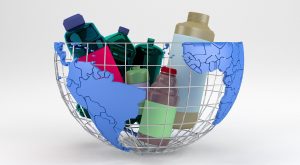Plastic products can be found in virtually all industries. This is due to their characteristics: adaptability, durability, and light weight, which make them a favourite in the construction, packaging, and automotive industries. This sector contributes to the process of innovation, promoting resource efficiency and, at the same time, creating jobs. Specifically, more than 1.6 million people are employed in approximately 50,000 small and medium-sized plastics processing companies. According to European Plastics Converters (EuPC), the Europe-wide professional body, whose activity covers all sectors of industry, including recycling, it generates a turnover of 260 billion euros per year,
Data shows that the importance of this sector is increasing. In 2019, the turnover of plastic processing companies in Spain increased by 1.41%, according to the latest ‘Estudio Anual de los Plásticos (Annual Study of Plastics)’ issued by the Centro Español de Plásticos (CEP). However, in contrast to this increase, the research shows a 13.1% decrease in employment in the plastics sector industries. Related to this fact, it must be noted that the packaging sector uses the transformation of plastics the most, with a 40.5%. It is followed by the automotive industry, with a 23.6%; construction, 15.8%; and electricity and electronics, with a 1.8%.
Other articles of interest: Plastics and fashion come together to create a more circular and sustainable sector
The study also carries out an analysis of the figures by autonomous community. It shows that there are three regions that share over 50% of the plastic transformation market in Spain, with Catalonia leading the way. However, Andalusia is the region that has increased its turnover the most this last year.
Finally, statistics are collected by type of material. HDPE was once again the most demanded of the year. Its consumption has increased during the last decade a 31.2%, reaching 962,629 metric tonnes. On the other hand, PVC was the plastic material that suffered the most significant decrease in consumption, dropping 33.6% in the last ten years.
The quality and performance of recycled polymers in Europe increases
Recycling is a process that is increasingly present in our society due to its importance for the Circular Economy. Moreover, new processes are emerging, and existing ones are becoming more efficient. Consequently, according to the survey conducted by Polymer Comply Europe on behalf of EuPC. the performance of recycled polymers has increased in 2019 compared to the previous two years.
Despite this increase in quality, the survey highlights the existing barriers that still limit a greater use of recycled polymers. Amongst the main problems for plastic processors are the insufficient replicability of properties from batch to batch and the visual appearance of products made from recycled polymers. Regarding this, it must be noted that out of the 28% of participants who currently do not use recycled polymers, 65% say they cannot use them because their product specifications do not allow their use. It is therefore essential to continue making progress in this field in order to make recycling a real and achievable solution for all industries.
Other articles of interest: Large companies join the circular economy: the Mondelez case







